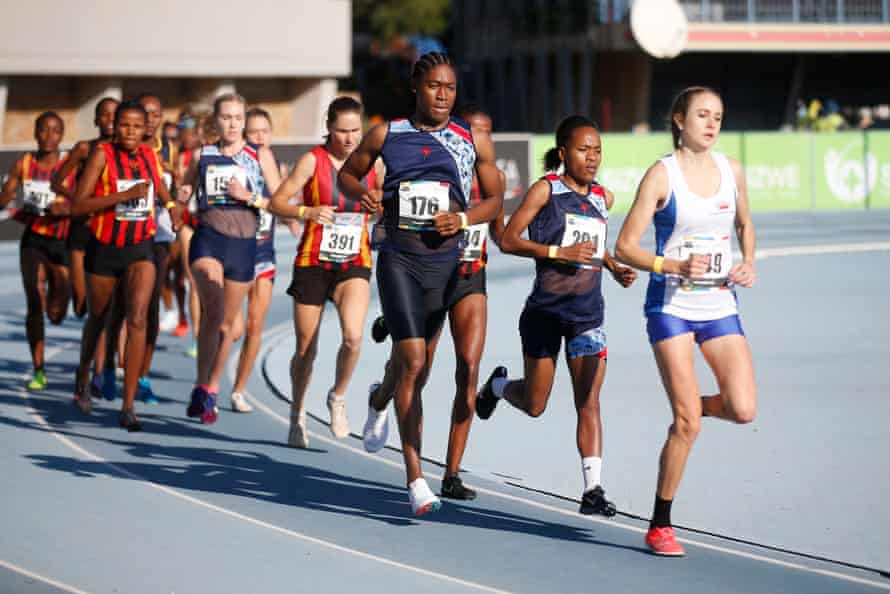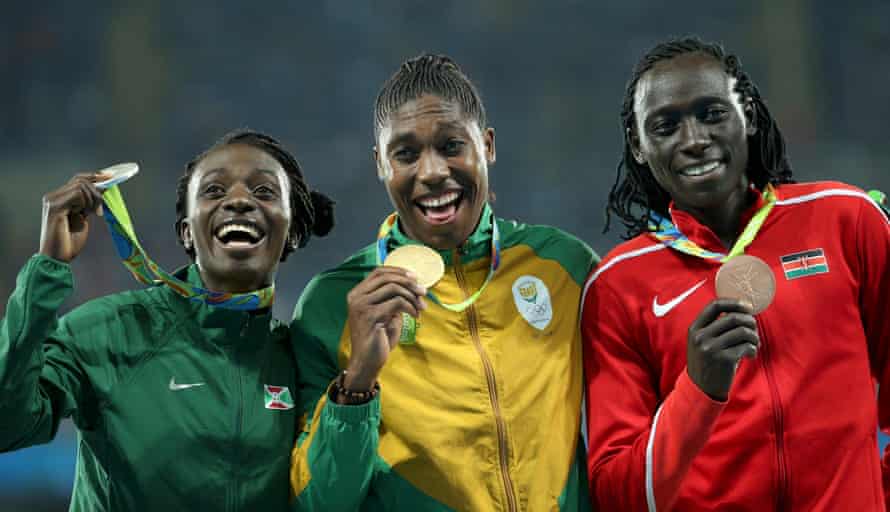Caster Semenya should be angry, but she isn’t. As the clock ticks down towards the Tokyo Olympics, the South African should, like her rivals, be training for the push to land a third consecutive gold medal.
Instead, the 30-year-old, who has fought a wave of prejudice and stigma throughout her life, is forlornly waiting on news from the European court of human rights (ECHR), which, in turn, could convince World Athletics that being asked to take medication is perhaps not the most humane way of dealing with a woman who has a congenital condition some believe hands her an unfair advantage.
Semenya’s “crime” – apart from dominating on the track – is that she is an athlete with differences in sex development, a condition that leads to elevated levels of testosterone in the body. This led athletics’ governing body to create a ruling in 2018, following her rapid rise to fame, which forbids women with a similar condition to compete internationally between 400m and mile-long races, unless medication – one option is to take a daily oral contraceptive pill – is taken. Needless to say, Semenya will not stay in that lane.“It’s taking the soul out of my body,” she tells the Guardian over the phone from South Africa. “They want me to take my own system down. I’m not sick. I don’t need drugs. I will never do that.”
As things stand, it seems highly unlikely that Semenya will be lining up for the 800m this summer, even if her case is decided favourably. The ECHR can only recommend the president of World Athletics, Sebastian Coe, changes tack. No hands will be forced.
“The message is very simple,” says Semenya. “As a man, he should look into his [former] wife’s eyes and say to her: ‘I gave you kids. If someone was treating our kids in this way, what would be your reaction?’ He needs to think as a human, not as the president of an organisation.”
Semenya is classified as an athlete with differences in sex development (DSD). The IAAF, as World Athletics was then known, introduced a ban on such athletes competing in women’s sport in 2018, a ruling upheld both by the court of arbitration for sport (Cas) in May 2019 and a subsequent appeal court. It prevented Semenya from defending her world championship title in Doha, and came as a bitter blow.
Appearing in the 5,000m is an option for Semenya, although time is not on her side. She triumphed at the South African national championships last week, recording 15mins 52sec – 42sec shy of the Olympic-qualifying standard of 15:10.
“I can run till I’m 40 and at the moment I’m still fast enough to try to improve,” she says, before insisting the next world championships in 2023 is a realistic target for the 5,000m.
Yet although the 200m has been ruled out, when it comes to her signature event – the 800m – will she be an interested spectator if the worst happens? The answer is yes, albeit through sceptical eyes. “I’ll always watch the 800m,” says Semenya, who ran a personal best of 1:54.25 in 2018. “I want to see if these girls are able to run what I am running. But will they be sub-1.55? Come on.”

The waiting, the arguments, the accusations would be enough to drive away many from the sport. Semenya, however, is calm. “I trained like a slave to be the greatest,” she says. “I’ve watched Usain Bolt train. His training was insane and I am the same. My high testosterone levels are something I was born with, it’s a disorder. It doesn’t make me the best, though. That’s where the training and knowledge comes in.
“Michael Phelps’s arms are wide enough for him to do whatever he wants. Swimmers’ lungs are different to other people’s. Basketball players like LeBron James are tall. If all the tall players are banned from playing, will basketball be the same? Usain has amazing muscle fibres. Are they going to stop him, too? My organs may be different and I may have a deep voice, but I am a woman.”
Announcing its ruling, the court agreed that the IAAF’s policy was “discriminatory” to athletes withDSD such as Semenya. However two of the three arbitrators accepted the IAAF’s argument that high testosterone in female athletes confers significant advantages in size, strength and power from puberty onwards, and said the policy was therefore “necessary, reasonable and proportionate” to ensure fair competition in women’s sport.

Semenya believes her legacy remains and becomes stronger with every shake of the head from the sporting powerbrokers. She says that she is fighting for the Caster Semenyas of tomorrow, for those who don’t have a voice.
She enjoys working and helping children in Pretoria, Polokwane and Soweto while another passion is her running club, Masai, which she runs with her wife, Violet Raseboya. The Caster Semenya Foundation, formed in 2016 and which focuses on education, will also keep her active for years to come.
“It’s very simple,” she says. “You should accept yourself, appreciate yourself and show the world. You need hope for life. You need to be positive.”
Retirement, when it comes, does not faze her. She anticipates running longer distances for at least another 10 years but the impact on the body of attempting the 200m, for example, will do little for her longevity. Her presence on the track, however, will remain.
“I have accomplished my goals,” she says. “Sure, I’m an Olympic champion. I’m a world champion, and I’ve won major titles. So, at the moment, we are trying to set things right for future generations because they are killing 800m women.
“They are killing sport. People want to see extraordinary performances and if I am a leader, I would give people what they want. Now Seb Coe is making it all about him. He has to act in the interest of all athletes, but now he wants to categorise us. He is seeing a young athlete, one the organisation has tried to stop, and has made it political. Just accept and enjoy it. His job is to fight corruption.”
Semenya, in conjunction with the beauty brand Lux, has begun a public campaign entitled Born This Way, which urges women to “express their beauty and femininity unapologetically”. A petition with the hashtag #IStandWithCaster has also been launched in the hope of swaying Coe’s mind.
Whatever happens, she says she will attempt to keep on fighting prejudice and injustice. “Some kids I have come across tried to commit suicide, others are survivors,” she says. “They can’t accept who they are. When you give birth to a kid, you can’t choose their path. Life is not an act.”
She has never met Coe – and has no plans to do so – yet the conversation in her mind would aim to strike the Englishman at his core. Semenya feels she has been targeted by World Athletics. For her, the instant success that led to gold at London 2012 and then in Rio four years later fuelled unfair accusations and recriminations.
“It is everything,” she says when asked about the reasons for the problems she has encountered over the years. “I’m a young black African. I know where I come from.”
World Athletics, in response to Semenya’s comments, said it “rejects any allegation that biological limits are based on race or gender stereotypes”.
The Tokyo Games, if they do proceed, may not feature one of South Africa’s most celebrated athletes, yet the force of change is already under way. Semenya has encountered many women with a similar condition to hers – “I can just tell when I see them” – and knows, unlike herself, they don’t have the platform to voice their angst.
“The regulations are not aimed at any particular athlete, but are designed to preserve the in
tegrity of the female category,” said World Athletics, which points to the fact that in the 800m final at the 2019 World Championships in Doha, Halimah Nakaayi of Uganda won gold, beating three other African women in the final. “We have seen in a decade and more of research that approximately 7.1 in every 1,000 elite female athletes in our sport are DSD athletes with very high testosterone levels in the male range.”
Nevertheless Semenya powers on through life. She recently became a mother – the name of her daughter remains a guarded secret for now – yet thoughts quickly turn as to how to explain this sporting saga when the time arrives. “It will be difficult,” she says. “She will be confused and will think how can a person try and cut down someone’s career?”
It is clear that Semenya feels many have tried, yet she will not go quietly. And why should she?